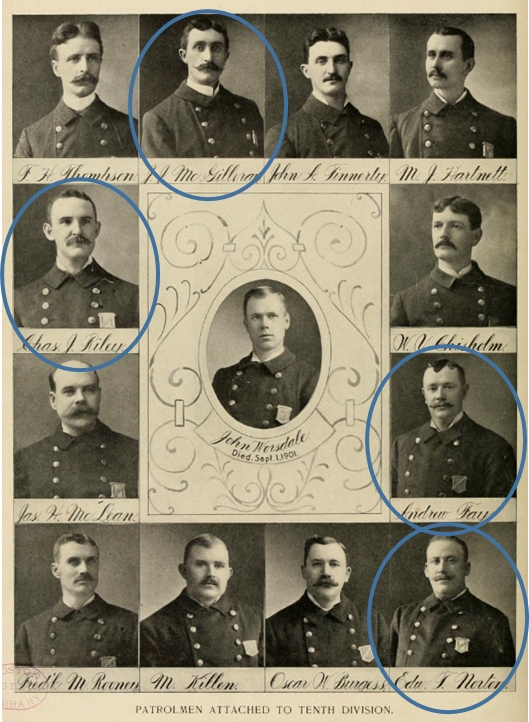
Four of the more than 1,100 men who went out on strike on September 9, 1919. (Source: Tappen, G. Arthur. The officers and the men, the stations without and within of the Boston Police (1901))
This week, on September 9, 2017, marks the 98th anniversary of the 1919 Boston Police Strike—just two years away from the centennial when the University of Massachusetts Boston and the Boston Police Department Archives plan to have compiled a biographical encyclopedia documenting each of the more than 1,100 police officers who went out on strike. Toward this goal, community volunteers have already made great progress with researching each man’s story.
What was the 1919 Boston Police Strike all about and how should Bostonians plan for its commemoration in 2019? At UMass Boston this semester, students in my History 620 Introduction to Public History and Public Memory course will explore these questions and more. As the students learn about how the past is remembered and interpreted outside of the classroom, they will have opportunities to tackle this tangible public history challenge. One of the students’ major assignments will be to develop ideas for museum exhibits, websites, and site-based programs for engaging public audiences in thinking about the strike and its significance from many perspectives.
At the first class meeting this week, students learned from project partners Joanne Riley, Interim Dean of University Libraries at UMass Boston, and Margaret Sullivan, Boston Police Department Archivist, about the research that is underway and the plans for ongoing engagement of “citizen researchers” over the course of the next two years. In addition, the students discussed one of the major published works on the subject, Francis Russell’s A City in Terror (1975), and identified the larger issues raised by this historical event and why it is important to remember today.
Questions about the course may be posted here or directed to carolyn.goldstein@umb.edu.
Interested in getting involved or learning more about the history of the 1919 Boston Police Strike? Please visit the 1919 Boston Police Strike Project blog at http://blogs.umb.edu/bpstrike1919.
